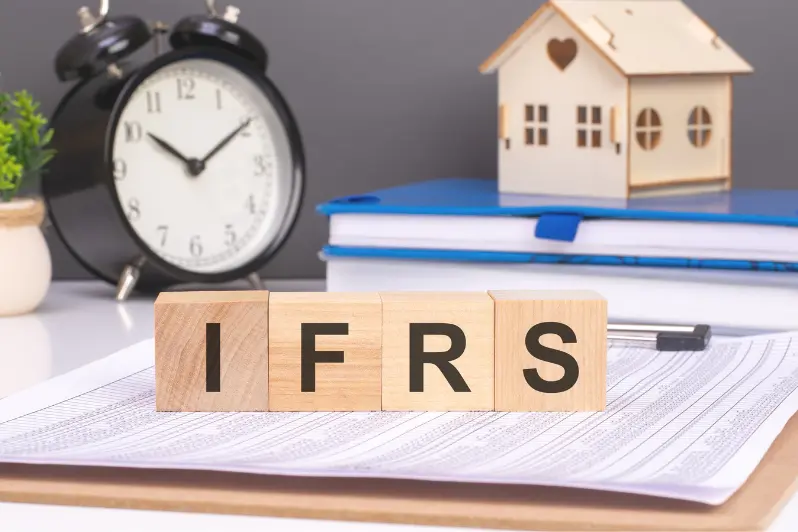Today, with the ever-evolving world of finance and business, many companies are adopting international financial reporting standards in their quest for expansion and prosperity. These standards are the primary tool that enables them to achieve transparency in their financial statements and provide investors with a clear picture of their financial reports.
If you rely on generally accepted accounting standards in preparing your financial statements and want to move to international standards, there is a wide range of requirements that you must meet, first and foremost related to adopting International Financial Reporting Standards (IFRS 1).
In this blog, we invite you to learn all the details related to adopting International Financial Reporting Standards (IFRS 1) and the requirements necessary for its implementation.
If you’d like to learn more, click here to contact us and ask any questions you may have. The team of specialized accountants at Farhat & Partners can help you navigate the details of the transition to international financial reporting standards.
IFRS 1: Adopting International Financial Reporting Standards for the First Time
IFRS 1 is the first adoption of International Financial Reporting Standards and is applied by companies when they prepare their financial statements for the first time according to International Financial Reporting Standards.
This standard was developed by the International Accounting Standards Board (IASB) to assist companies in transitioning to International Financial Reporting Standards (IFRS) and to provide facilities that will make its first adoption cost-effective, in addition to providing a broad set of guidelines to address the difficulty of transitioning to IFRS.
When is IFRS 1 applied for the first time?
Companies are required to apply IFRS 1 when they prepare their financial statements for the first time in accordance with IFRS, including the transition from applying generally accepted accounting standards (GAAP) to International Financial Reporting Standards (IFRS), so that their financial statements accordingly include an explicit, unqualified statement of compliance with IFRS.
Contact Us Now
Adoption of International Financial Reporting Standard (IFRS 1)
The basic principle for adopting International Financial Reporting Standard (IFRS 1) is based on the full and retrospective application of all International Financial Reporting Standards that are effective as of the date of the final balance sheet or the date of first reporting of financial statements prepared in accordance with International Standards.
However, there is a wide range of optional exemptions and mandatory exceptions provided by the IFRS 1 first-time adoption provisions that will help companies address the challenges they face in fully implementing IFRS retrospectively and mitigate the burden on them.
What are the requirements for adopting International Financial Reporting Standard (IFRS 1)?
For the first time, the International Financial Reporting Standard requires companies to comply with the following requirements:
- Learn about the first financial statements according to International Financial Reporting Standards.
- Preparing the opening balance sheet on the date of transition to the application of International Financial Reporting Standards.
- Select accounting policies that are consistent with International Financial Reporting Standards (IFRS) applicable at the end of the first financial reporting period and apply these policies retrospectively to all periods relevant to the first IFRS financial statements.
- Retrospective application of mandatory exceptions to the adoption of International Financial Reporting Standards.
- Taking into account the optional exemptions that may be applied and applying them retroactively as well.
- Providing clear disclosure of the transition mechanism to the application of International Financial Reporting Standards, including adjustments to equity and total income resulting from the transition from generally accepted accounting principles to International Financial Reporting Standards.
Mandatory exceptions to retrospective application of International Financial Reporting Standards
IFRS 1 identifies certain areas in which retrospective application of international standards is prohibited. This applies to the following aspects:
- Use estimates.
- Classification, measurement and impairment of financial assets.
- Accounting for non-controlling interests.
- Assets classified as held for sale and discontinued operations.
- Insurance Contract Accounting When IFRS 17 is applied.
Although the IFRS standard applies for the first time to a wide range of exceptions regarding the retrospective adoption of international standards, there are a variety of optional exemptions that reduce the burden of companies’ compliance with the requirements for adopting international standards, particularly in areas where it is difficult to obtain the information necessary for the retrospective application of international financial reporting standards, such as business combinations and the assets and liabilities of subsidiaries and joint ventures.
Requirements for applying International Financial Reporting Standards to the opening balance sheet
Applying International Financial Reporting Standards to the opening balance sheet is the starting point for all subsequent accounting processes that will be prepared in accordance with international standards. Therefore, there is a set of requirements that companies must consider when preparing their opening balance sheet, as follows:
- Include all assets and liabilities required by International Financial Reporting Standards.
- Exclude any assets or liabilities not permitted by International Financial Reporting Standards.
- Classify all assets and liabilities in accordance with international standards.
- Measure all items according to international standards and prepare and present them in the company’s first financial statements in accordance with International Financial Reporting Standards.
This concludes our article. We recommend you read other articles such as the Lease Accounting Standard , the International Accounting Standard for Financial Instruments , the Foreign Exchange Rate Standard , and the Share-Based Payment Standard .
Do you have any questions about adopting the International Financial Reporting Standards (IFRS 1)? Farhat & Co. is one of the most prominent certified accounting and financial services firms in the UAE . We have a team of accountants specializing in all matters related to the implementation of International Financial Reporting Standards.
Research and Studies Department
Farahat & Co.
Dubai, United Arab Emirates
For service inquiries:
WhatsApp (correspondence only): +971526922588
Email: sales@farahatco.com
